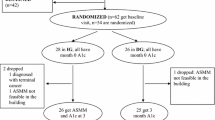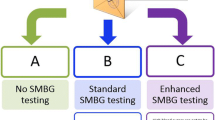Abstract
American Diabetes Association consensus statements have affirmed the crucial role of self-monitoring of blood glucose (SMBG) in modern therapy for diabetes mellitus (1,2). The 1987 statement emphasized the use of SMBG data by health care providers for evaluating and modifying the treatment regimen, whereas the 1994 statement gave greater emphasis to patients’ use of SMBG data to guide day-to-day treatment adjustments. Among the key functions of SMBG identified in the 1994 consensus statement were that patients should learn to use SMBG for self-adjustment of diet, exercise and/or medication, identifying and properly treating hypoand hyperglycemia, and improving diabetes decision making and problem solving. The American Diabetes Association’s standards for patient education programs similarly include training in the use of SMBG data as a required content area, and its clinical practice recommendations also encourage this (3,4). As a result, the American Diabetes Association has sanctioned efforts to teach patients how to use SMBG data actively as part of a patient-centered diabetes self-management regimen.
Access this chapter
Tax calculation will be finalised at checkout
Purchases are for personal use only
Preview
Unable to display preview. Download preview PDF.
Similar content being viewed by others
References
American Diabetes Association. Consensus statement on self-monitoring of blood glucose. Diabetes Care 1987; 10: 81–87.
American Diabetes Association. Consensus statement on self monitoring of blood glucose. Diabetes Care 1994; 17: 81–86.
American Diabetes Association. National standards for diabetes self-management education programs and American Diabetes Association review criteria. Diabetes Care 1995; 18: 737–41.
American Diabetes Association. Clinical practice recommendations, 1996. Diabetes Care 1996; 19(suppl 1):S1–118.
American Diabetes Association. Position statement: implications of the diabetes control and complications trial. Clinical Diabetes 1993; 11: 91–96.
Santiago JV. Perspectives in diabetes: lessons from the diabetes control and complications trial. Diabetes 1993; 42: 1549–54.
DCCT Research Group: The impact of the trial coordinator in the diabetes control and complications trial. Diabetes Ed 1993; 19: 509–512.
Wysocki T. SMBG: has the promise been fulfilled? Diabetes Spec 1988; 1: 83–87.
Wysocki T. Impact of blood glucose monitoring on diabetic control: obstacles and interventions. J Behav Med 1989; 12: 183–205.
Delamater AM, Davis S, Bubb J, Smith JA, White NH, Santiago JV. Self monitoring of blood glucose by adolescents with diabetes: technical skills and utilization of data. Diabetes Ed 1988; 15: 56–61.
Peyrot M, Rubin R. Insulin self-regulation predicts better glycemic control. Diabetes 1988; 37(suppl 1): 53A.
Wysocki T, Hough BS, Ward KM, Allen AA, Murgai N. Use of blood glucose data by families of children and adolescents with IDDM. Diabetes Care 1992; 15: 1041–44.
Delamater AM, Bubb J, Davis SG, Smith JA, Schmidt L, White NH, et al. Randomized, prospective study of self-management training with newly diagnosed diabetic children. Diabetes Care 1990; 13: 492–98.
Anderson BJ, Wolf FM, Burkhart MT, Cornell RG, Bacon GE. Effects of peergroup intervention on metabolic control of adolescents with IDDM: randomized outpatient study. Diabetes Care 1989; 12: 179–83.
Cox DJ, Kovatchev BP, Julian DM, Gonder-Frederick LA, Polonsky WH, Schlundt DG, et al. Frequency of severe hypoglycemia in insulin-dependent diabetes mellitus can be predicted from self-monitoring blood glucose data. J Clin Endocrinol Metab 79: 1659–62.
Gonder-Frederick LA, Cox DJ, Kovatchev B, Schlundt D, Clarke WL. A biopsychobehavioral model of risk of severe hypoglycemia. Diabetes Care 1997; 20: 661–69.
Wysocki T. The psychological context of SMBG. Diabetes Spec 1994; 7: 266–70.
Spevack M, Johnson SB, Harkavy JM, Silverstein JH, Shuster J, Rosenbloom A, et al. Diabetetologists’judgments of diabetic control: reliability and mathematical simulation. Diabetes Care 1987; 10: 217–24.
Bloom B, (ed). Taxonomy of educational objectives, book I. Cognitive domain. White Plains, NY: Longman, 1984.
Vargas J. Writing worthwhile behavioral objectives. New York: Harper and Row, 1972.
Editor information
Editors and Affiliations
Rights and permissions
Copyright information
© 2000 Springer Science+Business Media New York
About this paper
Cite this paper
Wysocki, T. (2000). Effective Utilization of Self-Monitored Blood Glucose Data: Cognitive and Behavioral Prerequisites. In: Stabler, B., Bercu, B.B. (eds) Therapeutic Outcome of Endocrine Disorders. Serono Symposia USA. Springer, New York, NY. https://doi.org/10.1007/978-1-4612-1230-0_15
Download citation
DOI: https://doi.org/10.1007/978-1-4612-1230-0_15
Publisher Name: Springer, New York, NY
Print ISBN: 978-1-4612-7052-2
Online ISBN: 978-1-4612-1230-0
eBook Packages: Springer Book Archive




